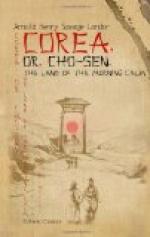A fight of this kind, even among children, lasts for several hours, and, as can well be imagined, at the end of it there are a great many bleeding noses and broken teeth, besides bruises in profusion. The victor in these fights is made much of and receives presents from his parents and the friends of the family. The principal streets and open spaces in Seoul, during the fighting period, are alive with these youthful combatants, and large crowds assemble to witness their battles, taking as much interest in them as do the Spaniards in their bull-fights, and certainly causing as much excitement.
More serious than these, however, are the hostilities which occasionally take place between two guilds. When I was in Seoul, there was a great feud between the butchers and those practising the noble art of plastering the houses with mud. Both trades are considered by the Coreans to belong to the lowest grade of society; and, this being so, the contest would naturally prove of an envenomed and brutal character. A day was fixed, upon which a battle should take place, to decide whose claims were to prevail, and a battle-field was selected on a plain just outside the South Gate of the city. The battle-field was intersected by the same small frozen rivulet which also crosses Seoul; and it was on the western side, near the city wall, where stood a low hill, that on the day appointed I took up my position to view the fight, sketch and note-book in hand.
The two armies duly arrived, and placed themselves in position, the butchers on one side of the stream, the plasterers on the other. There were altogether about eighteen hundred men in the field, that is to say, about nine hundred on each side. As I could not get a very good view from my high point of vantage, I foolishly descended to the valley to inspect the fighting trim of the combatants, with the result that when the signal for the battle to begin was given I found myself under a shower of missiles of all weights and sizes, which poured down upon me with incredible rapidity and solidity. Piles of stones had been previously massed together by the belligerent parties, and fresh supplies came pelting down incessantly. I must acknowledge I did not enjoy my position at all, for the stones went whistling past, above my head, fired as they were with tremendous force by means of slings.




